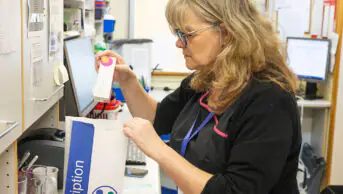
Shutterstock.com
Community pharmacists were able to complete referrals within the pharmacy for more than three quarters of patients referred from urgent and emergency care settings as part of a pilot, an NHS England official has said.
The pilot, which ran from 1 November 2021 to 30 September 2022 in nine clinical commissioning groups in England, enabled emergency departments and urgent treatment centres to refer patients to community pharmacy for help with minor illnesses and urgent repeat medicines supply through the Community Pharmacist Consultation Service (CPCS).
Speaking at The Pharmacy Show in Birmingham on 17 October 2022, Rob Proctor, senior policy and pharmacy integration lead at NHS England, said the pilot results showed that community pharmacies had completed 77% of the referrals from urgent and emergency care (UEC) settings within the pharmacy.
This included 34% of patients who received appropriate advice only; 33% of patients who received advice and were also sold a medicine; and 10% who received advice and were referred to a local pharmacy service supported by a patient group direction.
Of the remaining patients who received a pharmacist consultation, 15% were signposted to another clinician, 7% were escalated to another care setting and 0.7% were referred back to A&E, Proctor said.
According to the pilot service specification, pharmacies are paid £14 per consultation where the patient receives advice only; advice and a supply of medicine; or an onward referral to another part of the healthcare service.
Proctor said that the presenting conditions considered suitable for a CPCS referral from UEC were very similar to those of the other referral pathways, although there was a higher prevalence of minor injuries, such as ankle or foot pain and swelling, in UEC referrals.
He added that 92% of UEC patients offered a CPCS referral had accepted. Of the small number who declined, reasons included not wishing to leave the UEC setting or not thinking that their condition was suitable for treatment by a pharmacist.
As part of the Community Pharmacy Contractual Framework agreement for 2022/2023 and 2023/2024, announced on 22 September 2022, the pilot will be rolled out to all community pharmacies in England from March 2023.
“This pilot shows once again just how much pressure community pharmacies have the potential to take off other healthcare settings, if they have appropriate resources to do so,” said Alastair Buxton, director of NHS Services at the Pharmaceutical Services Negotiating Committee.
Leyla Hannbeck, chief executive of the Association of Independent Multiple Pharmacies, said that the data “represents a compelling call for action for government to revaluate its current position in relation to community pharmacy.
“The statistics illustrate how pharmacy can be a solution to the many demand pressures facing the healthcare system.
“But community pharmacy is currently facing significant challenges regarding workforce and funding and it requires investment in service provision if it is to meet the aspirations of the further clinical frontiers. Any new services must be funded realistically and commissioned outside of the global sum.”
Gareth Jones, director of corporate affairs at the National Pharmacy Association, said: “At a time when the whole healthcare system is under great strain, it’s important that patients see the right healthcare professional in the right place, which is very often a pharmacist in a community setting.
“These UEC data are further evidence that pharmacies are key to achieving a more appropriate distribution of caseload across the entire system, not just primary care.”
A final report on the pilot’s findings will be published in November 2022, Proctor said.


